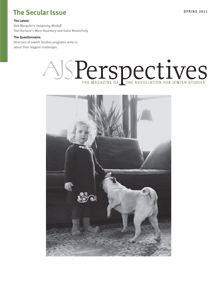Dear Colleagues,
We conceive of our 2011 issues as a pair: secularism and religion or, as we phrase it, the secular and religious issues. Usually considered antagonists, we find the pair to be symbiotic, even co-dependant. While the secular articles confront issues as varied as Spinoza and secular sex, Walter Benjamin's Kabbalah and Jews and dogs, all conclude—or at least confess—that secularism can never be fully disentangled from religion. This is not to claim that Jewish cultural practices are shadow plays approximating or imitating religious ritual, but rather that the articulation of one term relies on the other. The secular and the religious come out of the same thought world; modernity creates the two by splitting them from a single flesh.
Hardly antagonists, secularism and religion are not equivalents either. Their imbrication makes the individual terms difficult to distinguish and even harder to define. Is one the absence of the other? Is the other compensation for the absence? Rather than walk down the hall of mirrors required to define these terms, let us share an editorial anecdote. In soliciting articles for the secular issue, we asked scholars to write about secularism. To our delight, everyone whom we approached agreed, informing us of the specific topics that they intended to explore. No one inquired what we meant by secularism or protested that their research fell outside its parameters. As we finished work on this issue, we began planning the religious issue. Again we turned to scholars in the field and asked them to contribute. This time the "yeses" came more haltingly. Several potential contributors asked us what we intended for an issue devoted to religion. Writers wanted to know about definition, concept, and if their scholarship truly fit the bill. Scholars of the Bible let us know that religion falls outside of their research programs. Certainly, factors like time of year and number of commitments played a role in these responses, but we suspect that something more may lie behind the certainty about secularism and the bafflement about religion.
Some have argued that the very notion of religion is alien to Judaism, an always shifting intersection of ethnicity, philosophy, culture, and national aspiration. Did Judaism have to become a religion in order to be translated into a Christian and later an Islamic milieu? Is something like secularism, in fact, closer to what the Jews were before the institutionalization of Christianity? Or, is the very question of how religion emerges from Jewish texts and history problematic and paradoxical?
Perhaps the very name of the guild—Jewish Studies—renders the place of Judaism uncertain. Many a topic can be recognized as Jewish while the question of its religiousness remains open. Funding structures may also influence our comfort with secularism. The Posen Foundation has sponsored conferences, summer seminars, and the development of new courses exploring Jewish secularism. The very idea of funding similar events devoted to the study of religion is more complex. Who would put up the money? With what goals in mind? What historical periods and what kinds of Judaism would count as religious? On many North American campuses, we often leave questions of religion to Hillel as we conduct our courses on the safer terrain of Jewish Studies.
It seems that as our sense of what constitutes a religious Jew narrows, our discomfort with religion increases. Or maybe the difference between Jewishness and Judaism widens. Whatever the case may be, we are pleased to present you the "Secular Issue" and look forward to continuing the conversation with the "Religious Issue" in the fall.
Matti Bunzl
University of Illinois at Urbana-Champaign
Rachel Havrelock
University of Illinois at Chicago


